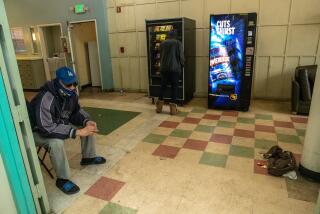Finances Improving, Aquatics Center Says : Recreation: New management is devising a plan to pay off the facility’s $3.4-million debt to the city, director says.
- Share via
PASADENA — Despite defaulting on a $350,000 loan payment to the city late last year, the financially troubled Rose Bowl Aquatics Center is in better shape than it was a year ago, center officials said this week.
The $6.5-million public swimming facility in Brookside Park has aggressive new management that has developed a plan to pay off the center’s debt to the city. They hope that the kinds of snafus that plagued the facility last year will not recur, executive director Bernard Brown said.
“In a seasonal sport like aquatics,” Brown said, “we’ve gotten through the winter, when expenses are greatest and income is lowest, and now we’re moving into summer. I really feel everything’s going to be OK.”
Center officials are expected to present a plan to the City Council this month that will include a new schedule of payments for its $3.4-million debt to the city. City officials deny reports that they are considering taking over the facility, which is run by an independent 22-member board.
“Better for them to work their way out of the situation they’ve gotten themselves into than for us to take over and end up with their $3.4-million debt,” Mayor Rick Cole said.
Brown, who took over the center’s reins less than a year ago, said it was beset by equipment problems last summer at the height of the swimming season. First, there was a break in a water main, which resulted in mud being pumped into the swimming pools, and then a breakdown of the filtration system, he said.
In addition, the center hosted a money-losing swimming and diving meet--the U.S. Swimming Assn.-sponsored Junior Nationals, West championships--for a week. Such meets generally receive support from local businesses, including hotels offering complimentary rooms and restaurants picking up some of the lunch and dinner tabs, Brown said.
“You make money if you can get the support of businesses in the community to help defray the expenses,” Brown said.
Although there was some business support last year, Brown said, it fell below expectations. But future meets should generate enough income to push the center out of the red, he said.
The aquatics center, which was built with city money and received donation pledges from corporations and private donors, has been in financial difficulties since it opened in mid-1990. It failed to pay $350,000 to the city, due Dec. 31, 1992, even though payments had been reduced and stretched out in an agreement with the city.
With the Southern California economy weakened by recession, center officials said, many pledged donations came in short or not at all.
At the same time, the center was largely without direction for 18 months in 1991 and 1992. After the center’s first executive director, Terry Wilson, resigned in early 1991, the board of directors, under pressure from the City Council to find an African-American as manager, engaged in a lengthy search for Wilson’s replacement. Brown took over in June, 1992.
“Any operation will suffer if it’s without an executive director or a key manager for a year and a half,” board treasurer Walter Morris said.
But the center, which has maintained its tax-exempt status with the Internal Revenue Service, expects to work out a new agreement with the city, officials said.
In the meantime, the program has been successful with young people, Brown said.
“We’re building esteem and making a difference in kids’ lives that will last forever,” he said.
More to Read
Sign up for Essential California
The most important California stories and recommendations in your inbox every morning.
You may occasionally receive promotional content from the Los Angeles Times.













